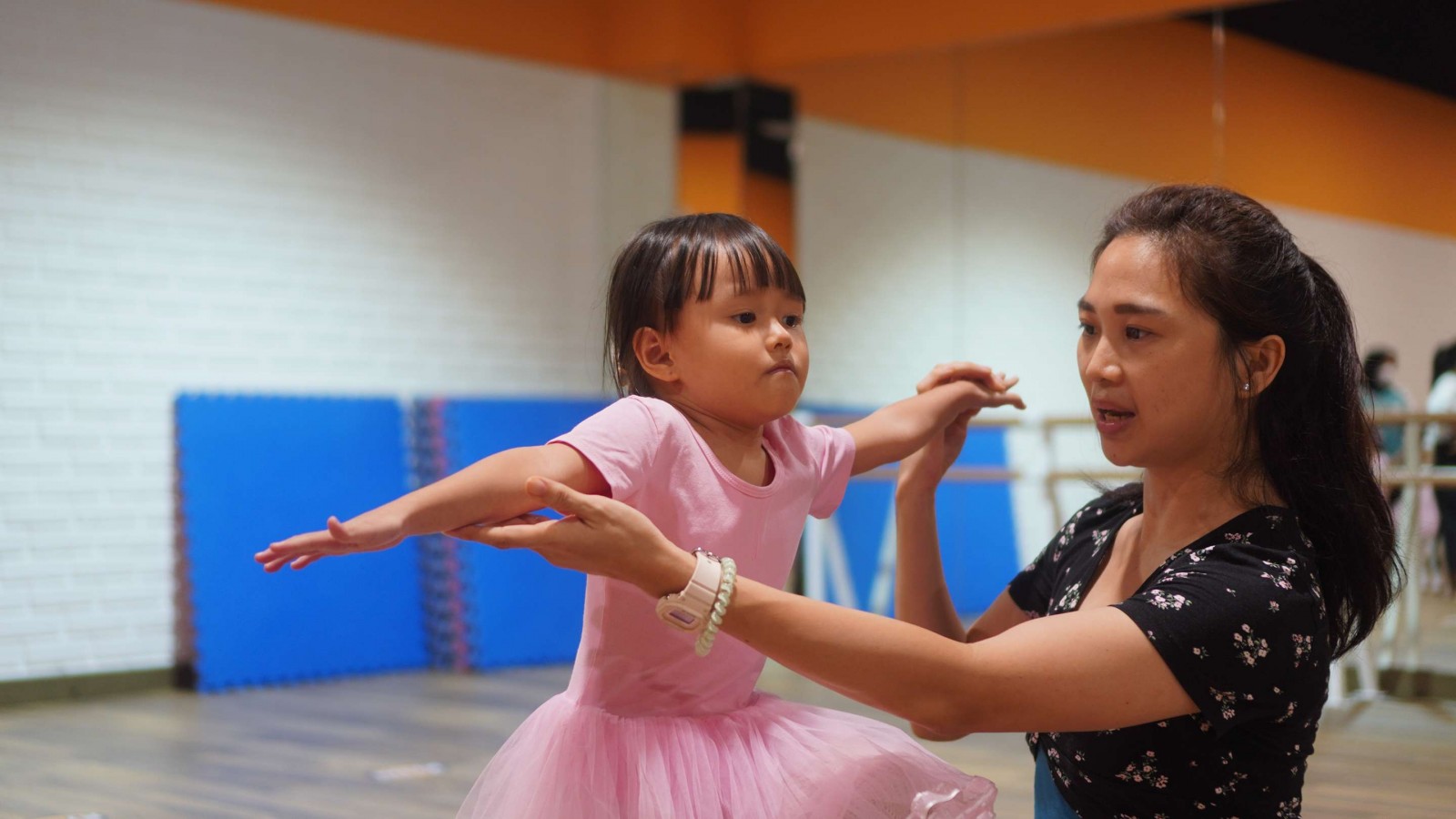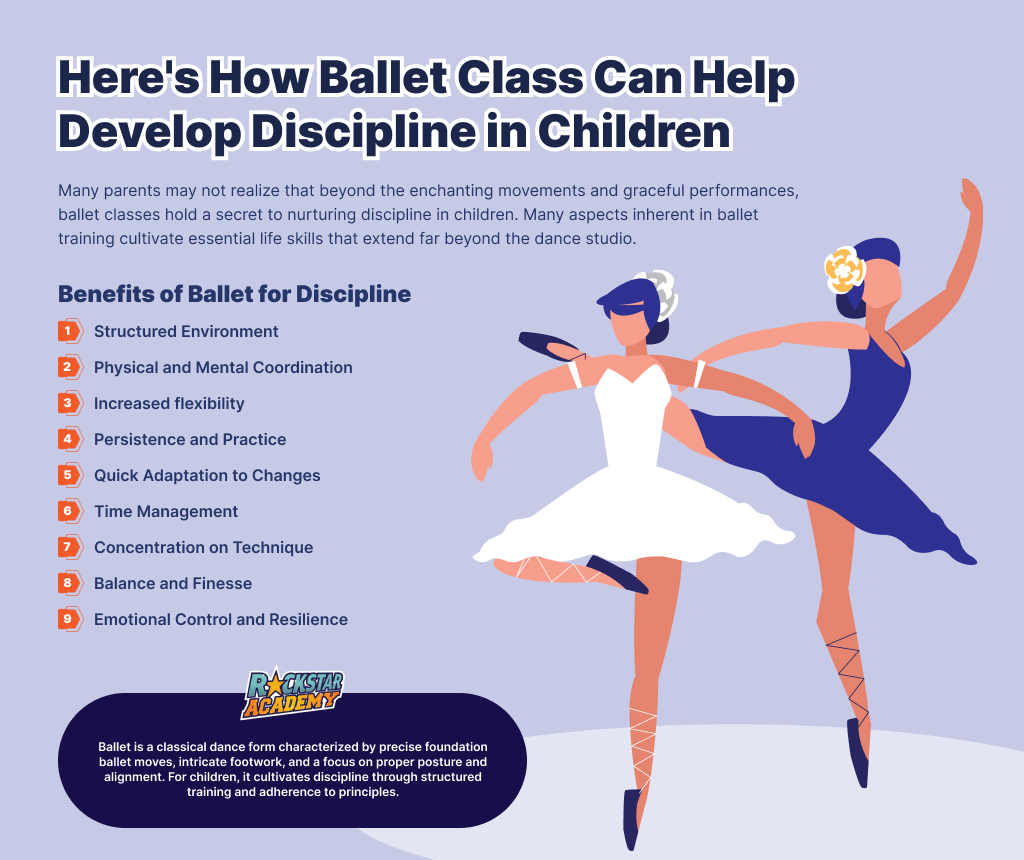Here's How Ballet Class Can Help Develop Discipline in Children

Many parents may not realize that beyond the enchanting movements and graceful performances, ballet classes hold a secret to nurturing discipline in children. Many aspects inherent in ballet training cultivate essential life skills that extend far beyond the dance studio.
In this article, we explore how ballet can significantly contribute to the development of discipline in children. Whether you're considering enrolling your child or curious about the benefits, read on to discover how ballet fosters discipline and shapes young minds.
Introduction to Ballet and Discipline
Ballet is a classical dance form characterized by precise foundation ballet moves, intricate footwork, and a focus on proper posture and alignment. For children, it cultivates discipline through structured training and adherence to principles.
In a ballet class, students not only learn technical skills but also develop essential traits like focus, persistence, and respect for others.
Discipline in ballet refers to learning, practicing, and demonstrating expected behaviors specific to this dance form. It goes beyond simply memorizing steps; it involves commitment, concentration, and self-control. For dancers, discipline stems from the desire to improve and perfect their technique. Every class presents an opportunity to refine movements, strengthen muscles, and enhance coordination, all of which require patience and perseverance.
Ballet training also instills self-discipline and critical thinking skills. Each movement in ballet is intentional and precise, requiring dancers to focus on their posture, balance, and timing. Additionally, ballet teaches the body to communicate through choreographed sequences, allowing dancers to express emotions and stories through movement.
A typical ballet class follows a structured format, beginning with barre exercises, followed by center work, and ending with across-the-floor combinations. These exercises are carefully designed to build strength, flexibility, and grace. To execute them correctly, dancers must pay close attention to detail, follow a logical sequence, and connect their movements with the accompanying music. This structured approach helps develop the discipline needed to meet ballet’s high standards.
More importantly, the commitment to consistent training builds habits that extend beyond the dance studio. The discipline gained from ballet can positively impact other areas of life, such as academics, time management, and problem-solving skills.
For ballet teachers, discipline is not just about enforcing rules but it is about fostering dedication and respect for the art. Ballet has a rich history dating back to the Renaissance period, and its structured traditions have been passed down for generations. By maintaining discipline in the classroom, teachers preserve these traditions while ensuring students develop the skills necessary to succeed.
One of the key aspects of discipline in ballet is accepting feedback. Teachers provide corrections to help students improve, but some dancers, especially teenagers, may misinterpret these corrections as personal criticism. In reality, teachers apply discipline to the class as a whole, with the goal of helping every student reach their full potential.
Benefits of Ballet for Discipline
Ballet offers several benefits that contribute significantly to the development of discipline in children, such as:
1. Structured Environment
Ballet classes provide a highly structured environment where children learn to follow routines and instructions. Each class begins with specific warm-up exercises at the barre, followed by center work and choreographed routines.
This structured format teaches children the importance of following a schedule and adhering to a set routine, which are fundamental aspects of discipline.
For example, young ballet students learn to listen attentively to their teacher's instructions and execute movements in a disciplined manner. This contributes to their overall growth in the art form.
2. Physical and Mental Coordination
Ballet requires precise coordination of body movements with music and rhythm. This dual focus on physical and mental coordination fosters discipline as children strive to master each movement with accuracy and grace.
For instance, when learning a pirouette (a turning movement), students must coordinate their body alignment, balance, and timing to execute the spin correctly.
This process not only enhances their physical abilities but also sharpens their mental discipline by training them to concentrate on multiple aspects simultaneously.
3. Increased flexibility
Flexibility is commonly associated with ballet dancers rather than athletes, yet it offers a significant advantage: reduced injury risk. While most sports include flexibility training, ballet classes focus intensely on enhancing flexibility, preparing the body to withstand greater stress without injury.
4. Persistence and Practice
In ballet, progress is achieved through consistent practice and persistence. Children learn the value of hard work and dedication as they strive to perfect techniques and routines.
For example, mastering a ballet sequence may require weeks or months of practice. Through perseverance and regular attendance, students develop discipline by overcoming challenges and refining their skills over time.
This dedication not only improves their dance abilities but also instills a sense of achievement through disciplined effort.
5. Quick Adaptation to Changes
Ballet dancers must quickly adapt to changes in choreography, music cues, or directions from their instructor. This requires dancers to stay alert and attentive throughout the class, as any deviation from the routine can affect the entire performance.
This ability to adapt swiftly fosters mental agility and teaches children the importance of staying focused even in unpredictable situations.
6. Time Management
Ballet classes teach children the importance of time management. Balancing school, extracurricular activities, and ballet practice requires effective scheduling and prioritization.
A young ballet student learns to manage their time by ensuring they arrive punctually for classes, complete assignments on schedule, and allocate sufficient time for both practice and relaxation. This skill is crucial in developing discipline outside the dance studio, preparing children for academic responsibilities and future endeavors.
7. Concentration on Technique
Ballet places a strong emphasis on technique which requires dancers to focus intensely on details such as body alignment, posture, and movement quality. Dancers will learn to concentrate deeply on executing each step correctly, which enhances their ability to maintain focus over extended periods.
This disciplined concentration not only improves their dance skills but also transfers to academic tasks and other activities where sustained attention is required.
8. Balance and Finesse
Skills like balance and agility, central to ballet, are valuable for athletes like football players who need to maneuver swiftly and outmaneuver opponents. While athletes may not perform ballet-specific moves, the underlying principles enhance their ability to maintain balance and agility in critical moments.
9. Emotional Control and Resilience
Ballet often involves intense physical and emotional exertion, such as performing challenging movements or facing critiques from instructors. Dancers learn to manage their emotions and maintain composure under pressure, developing emotional control and resilience.
This skill is invaluable in sports and everyday life situations where maintaining focus and emotional stability is essential for success.
Let’s Develop Discipline Through Ballet Class!
In conclusion, enrolling your children in ballet classes can significantly enhance their discipline and personal growth. Consider joining a reputable academy like Rockstar Academy, renowned for its comprehensive Sports & Performing Arts programs.
At Rockstar Academy, children not only participate in RAD Ballet Testing, Ballet & Contemporary Dance Recitals, Ballet Elite Championships and RockOlympics but also benefit from a curriculum designed to foster discipline and excellence.
RockOlympics is a dynamic event that offers both individual and team competitions, providing participants with a range of exhilarating experiences. Whether competing solo to test personal limits or collaborating with a team to achieve collective goals, RockOlympics ensures a challenging and rewarding environment for all.
These experiences not only encourage physical activity and sportsmanship but also teach valuable lessons in resilience and sports etiquette. To explore these opportunities further, Rockstar Academy offers a free trial class for newcomers.
Don't hesitate to contact Rockstar Academy today and embark on a journey of discipline and artistic expression for your child!

FAQ
How can ballet help shy children develop discipline?
Ballet encourages shy children to come out of their shells by providing a nurturing environment where they can express themselves through movement. Over time, they learn to focus and follow instructions, boosting their confidence and discipline.
What age is suitable for starting ballet classes?
Typically, children can start ballet classes around the age of 3 or 4. Early exposure helps in developing coordination, discipline, and a love for dance.
How often should children attend ballet classes to see improvement in discipline?
Consistency is key. Regular attendance, usually once or twice a week, allows children to build on their skills, develop discipline through practice, and progress in their ballet journey.



